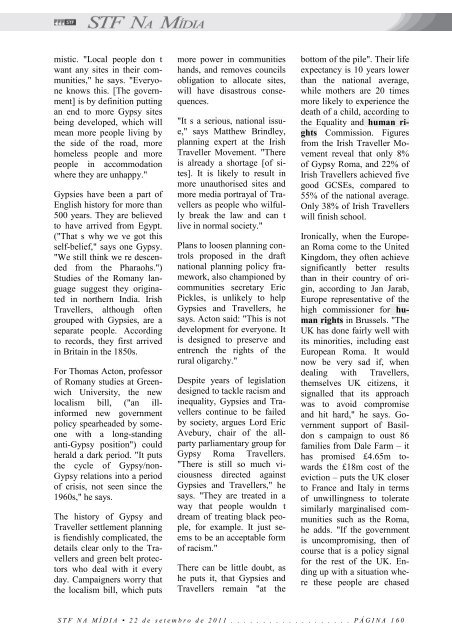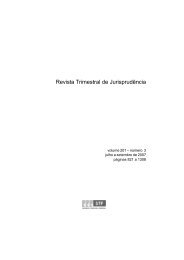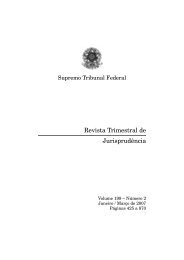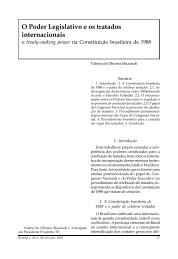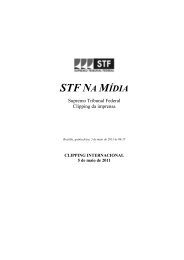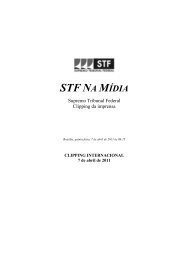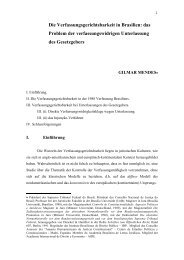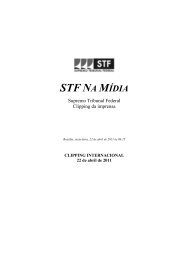STF NA MÍDIA
STF NA MÍDIA
STF NA MÍDIA
Create successful ePaper yourself
Turn your PDF publications into a flip-book with our unique Google optimized e-Paper software.
mistic. "Local people don t<br />
want any sites in their communities,"<br />
he says. "Everyone<br />
knows this. [The government]<br />
is by definition putting<br />
an end to more Gypsy sites<br />
being developed, which will<br />
mean more people living by<br />
the side of the road, more<br />
homeless people and more<br />
people in accommodation<br />
where they are unhappy."<br />
Gypsies have been a part of<br />
English history for more than<br />
500 years. They are believed<br />
to have arrived from Egypt.<br />
("That s why we ve got this<br />
self-belief," says one Gypsy.<br />
"We still think we re descended<br />
from the Pharaohs.")<br />
Studies of the Romany language<br />
suggest they originated<br />
in northern India. Irish<br />
Travellers, although often<br />
grouped with Gypsies, are a<br />
separate people. According<br />
to records, they first arrived<br />
in Britain in the 1850s.<br />
For Thomas Acton, professor<br />
of Romany studies at Greenwich<br />
University, the new<br />
localism bill, ("an illinformed<br />
new government<br />
policy spearheaded by someone<br />
with a long-standing<br />
anti-Gypsy position") could<br />
herald a dark period. "It puts<br />
the cycle of Gypsy/non-<br />
Gypsy relations into a period<br />
of crisis, not seen since the<br />
1960s," he says.<br />
The history of Gypsy and<br />
Traveller settlement planning<br />
is fiendishly complicated, the<br />
details clear only to the Travellers<br />
and green belt protectors<br />
who deal with it every<br />
day. Campaigners worry that<br />
the localism bill, which puts<br />
more power in communities<br />
hands, and removes councils<br />
obligation to allocate sites,<br />
will have disastrous consequences.<br />
"It s a serious, national issue,"<br />
says Matthew Brindley,<br />
planning expert at the Irish<br />
Traveller Movement. "There<br />
is already a shortage [of sites].<br />
It is likely to result in<br />
more unauthorised sites and<br />
more media portrayal of Travellers<br />
as people who wilfully<br />
break the law and can t<br />
live in normal society."<br />
Plans to loosen planning controls<br />
proposed in the draft<br />
national planning policy framework,<br />
also championed by<br />
communities secretary Eric<br />
Pickles, is unlikely to help<br />
Gypsies and Travellers, he<br />
says. Acton said: "This is not<br />
development for everyone. It<br />
is designed to preserve and<br />
entrench the rights of the<br />
rural oligarchy."<br />
Despite years of legislation<br />
designed to tackle racism and<br />
inequality, Gypsies and Travellers<br />
continue to be failed<br />
by society, argues Lord Eric<br />
Avebury, chair of the allparty<br />
parliamentary group for<br />
Gypsy Roma Travellers.<br />
"There is still so much viciousness<br />
directed against<br />
Gypsies and Travellers," he<br />
says. "They are treated in a<br />
way that people wouldn t<br />
dream of treating black people,<br />
for example. It just seems<br />
to be an acceptable form<br />
of racism."<br />
There can be little doubt, as<br />
he puts it, that Gypsies and<br />
Travellers remain "at the<br />
bottom of the pile". Their life<br />
expectancy is 10 years lower<br />
than the national average,<br />
while mothers are 20 times<br />
more likely to experience the<br />
death of a child, according to<br />
the Equality and human rights<br />
Commission. Figures<br />
from the Irish Traveller Movement<br />
reveal that only 8%<br />
of Gypsy Roma, and 22% of<br />
Irish Travellers achieved five<br />
good GCSEs, compared to<br />
55% of the national average.<br />
Only 38% of Irish Travellers<br />
will finish school.<br />
Ironically, when the European<br />
Roma come to the United<br />
Kingdom, they often achieve<br />
significantly better results<br />
than in their country of origin,<br />
according to Jan Jarab,<br />
Europe representative of the<br />
high commissioner for human<br />
rights in Brussels. "The<br />
UK has done fairly well with<br />
its minorities, including east<br />
European Roma. It would<br />
now be very sad if, when<br />
dealing with Travellers,<br />
themselves UK citizens, it<br />
signalled that its approach<br />
was to avoid compromise<br />
and hit hard," he says. Government<br />
support of Basildon<br />
s campaign to oust 86<br />
families from Dale Farm – it<br />
has promised £4.65m towards<br />
the £18m cost of the<br />
eviction – puts the UK closer<br />
to France and Italy in terms<br />
of unwillingness to tolerate<br />
similarly marginalised communities<br />
such as the Roma,<br />
he adds. "If the government<br />
is uncompromising, then of<br />
course that is a policy signal<br />
for the rest of the UK. Ending<br />
up with a situation where<br />
these people are chased<br />
S T F N A M Í D I A • 2 2 d e s e t e m b r o d e 2 0 1 1 . . . . . . . . . . . . . . . . . . . P Á G I N A 1 6 0


